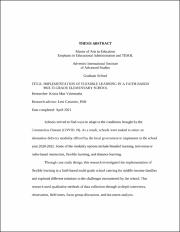| dc.description.abstract | Schools strived to find ways to adapt to the conditions brought by the Coronavirus Disease (COVID-19). As a result, schools were tasked to select an alternative delivery modality offered by the local government to implement in the school year 2020-2021. Some of the modality options include blended learning, television or radio-based instruction, flexible learning, and distance learning.
Through case study design, this research investigated the implementation of flexible learning in a faith-based multi-grade school catering for middle-income families and explored different solutions to the challenges encountered by the school. This research used qualitative methods of data collection through in-depth interviews, observation, field notes, focus group discussion, and document analysis.
Findings revealed that small schools, particularly multi-grade schools, were able to implement flexible learning through some administrative and instructional adaptations, taking advantage of easily accessible resources. However, small schools are in need of assistance in their finances, production of learning materials, professional development, and supervision of instruction to fully develop a flexible learning program.
Conclusions that came out of the findings revealed seven elements of successful flexible learning implementation in small faith-based schools: collaborative effort, continuous professional development, technology integration, financial stability, instructional support, intensified integration of faith and learning, and supervisory assistance. Recommendations focused on building resilient schools through the support of various stakeholders. | en_US |

